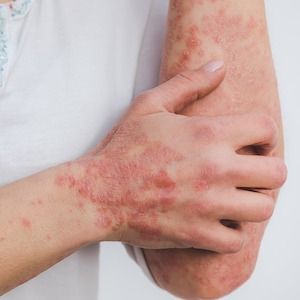Probiotic Supplementation May Serve as Psoriasis Treatment Option, Study Finds
This meta-analysis demonstrates the possibilities for probiotic supplementation, though additional multi-center clinical studies with larger samples may be needed.

Dermatology Life Quality Index (DLQI) and Psoriasis Area Severity Index (PASI) scores may decrease following probiotic supplementation, according to recent findings, suggesting that such supplements may serve as a treatment for the skin disease.1
These data were the conclusions of a recent meta-analysis of studies evaluating the role of probiotics in the mediation of psoriasis. The analysis assessed probiotic supplements’ efficacy for the treatment of patients with the inflammatory skin condition, using a total of 5 studies on the subject.
This new research was led by Xiaoshu Liao, BS, and Kebo Wei, MM, from the Hospital of Chengdu University of Traditional Chinese Medicine’s department of dermatology in China.
“The mechanism may be to increase the enrichment of Foxp3+ regulatory T cells to the skin and reduce apoptosis-mediated skin inflammation, thus restoring homeostasis through immunomodulation,” Liao and colleagues wrote. “Thus, probiotics may have a therapeutic effect on psoriasis through immunomodulation of gut microbiome.”2
Meta-Analysis
The investigators carried out a comprehensive assessment up until November 2023, with the evaluation implementing the Embase, Cochrane Library, Web of Science, and PubMed databases. They used a combination of keywords, some of which included titles, medical subject headings (MeSH), and abstracts.
The criteria for study inclusion encompassed randomized controlled trials (RCTs) that were in English and studies specifically looking at psoriasis. Test groups would have been given a probiotic treatment and those in the control arms would be given a placebo.
Criteria for exclusion from the team’s analysis encompassed non-RCTs, trials not shown to be pertinent to the different group comparisons, females who were pregnant or lactating, trials on animals, publications shown to have been duplicates, and trials without available data. Primary outcomes of interest to the investigators were PASI and DLQI scores, with higher scores suggesting greater severity of patients’ disease and lower scores suggesting milder disease.
Screenings of the abstracts and titles were conducted by independent authors based on the criteria of eligibility. Full texts were later given a review by another investigator to determine their inclusion, and any disagreements or discrepancies during the assessment were resolved through the use of a third author.
Some of the data extracted from each study included research characteristics, comparisons, interventions, number of probiotics, and outcomes. The research team made contact with study investigators through email if they needed to collect any raw or missing data.
Findings
Overall, the investigators ended up with a total of 5 trials in their meta-analysis. Within these studies, there were a total of 286 study participants assessed.
In the research team’s pooled analysis results, they reported that the probiotic supplementation efficacy data indicated that supplements had been superior to placebo in their use for psoriasis treatment. The PASI and DLQI scores of the subjects were noted by the team as having seen changes following probiotic use, with PASI score decreases (SMD = −1.40, 95% Cl = −2.63 to −0.17, P < .00001) and DLQI score decreases (SMD = −0.92, 95% Cl = −1.86 to 0.01, P < .00001) observed.
The investigators added that prior research had suggested a connection between gut microbiota and inflammatory dermatoses, noting that microbiome dysbiosis could result in greater epithelial permeability of patients’ intestinal mucosa and lead to chronic systemic inflammation.
“However, the specific mechanisms underlying are still unclear,” they wrote. “More high-quality, large-sample, and long-term trials are required to figure out the underlying mechanisms and provide more reliable and accurate efficacy evidence in the future.”
References
- Wei K, Liao X, Yang T, et al. Efficacy of probiotic supplementation in the treatment of psoriasis—A systematic review and meta-analysis. J Cosmet Dermatol. 2024; 00: 1-7. doi:10.1111/jocd.16299.
- Atabati H, Esmaeili SA, Saburi E, et al. Probiotics with ameliorating effects on the severity of skin inflammation in psoriasis: evidence from experimental and clinical studies. J Cell Physiol. 2020; 235(12): 8925-8937.